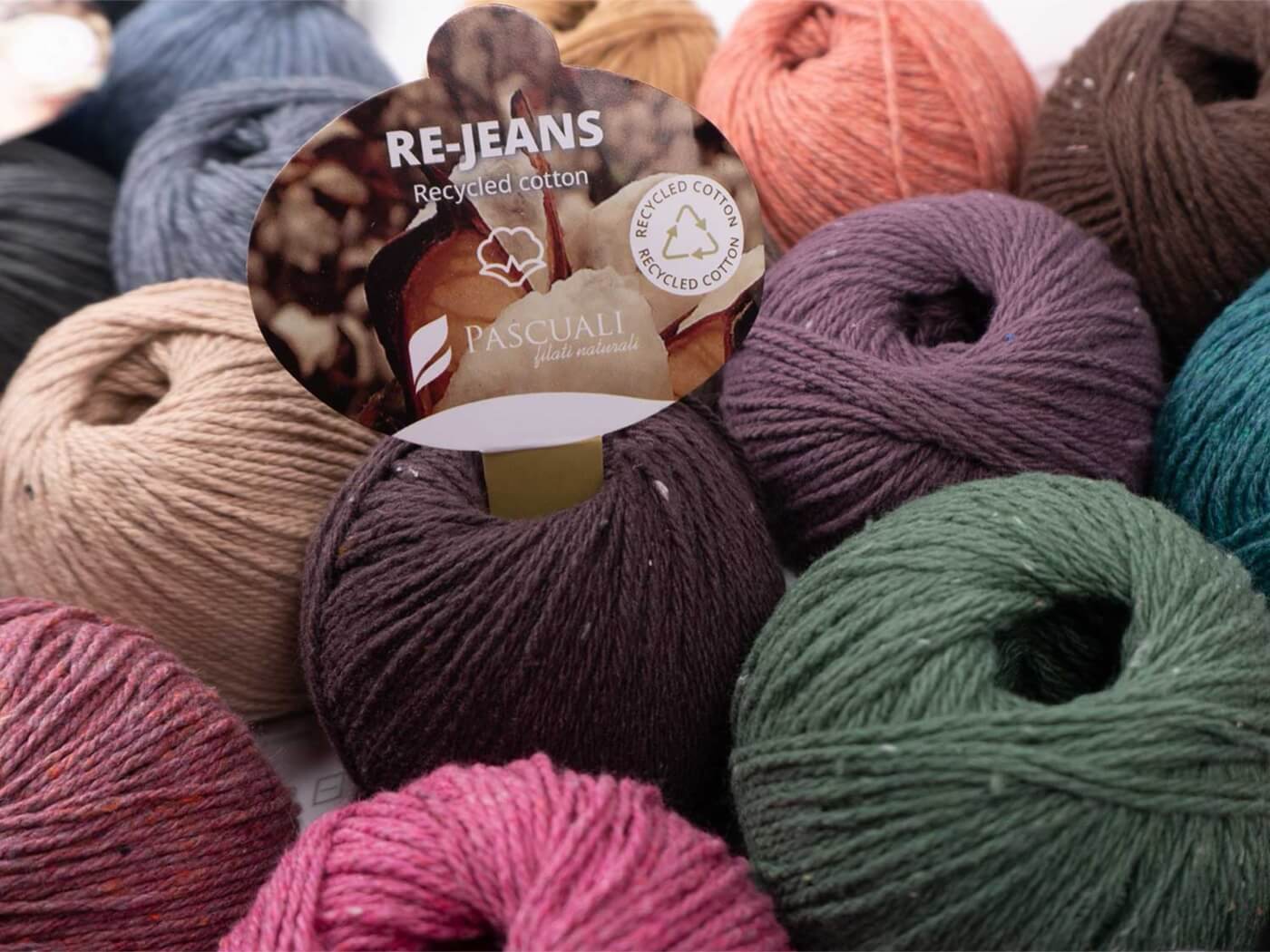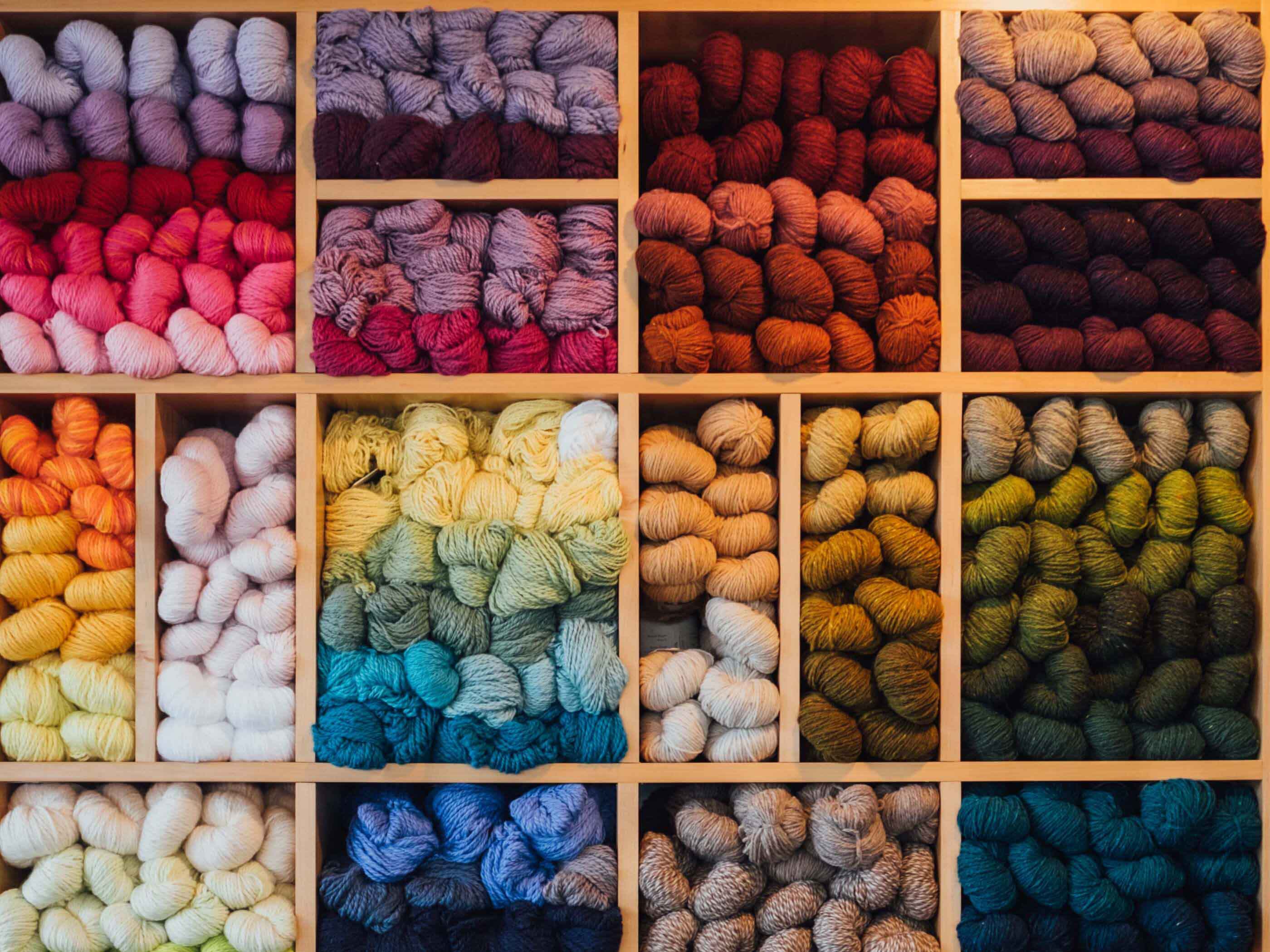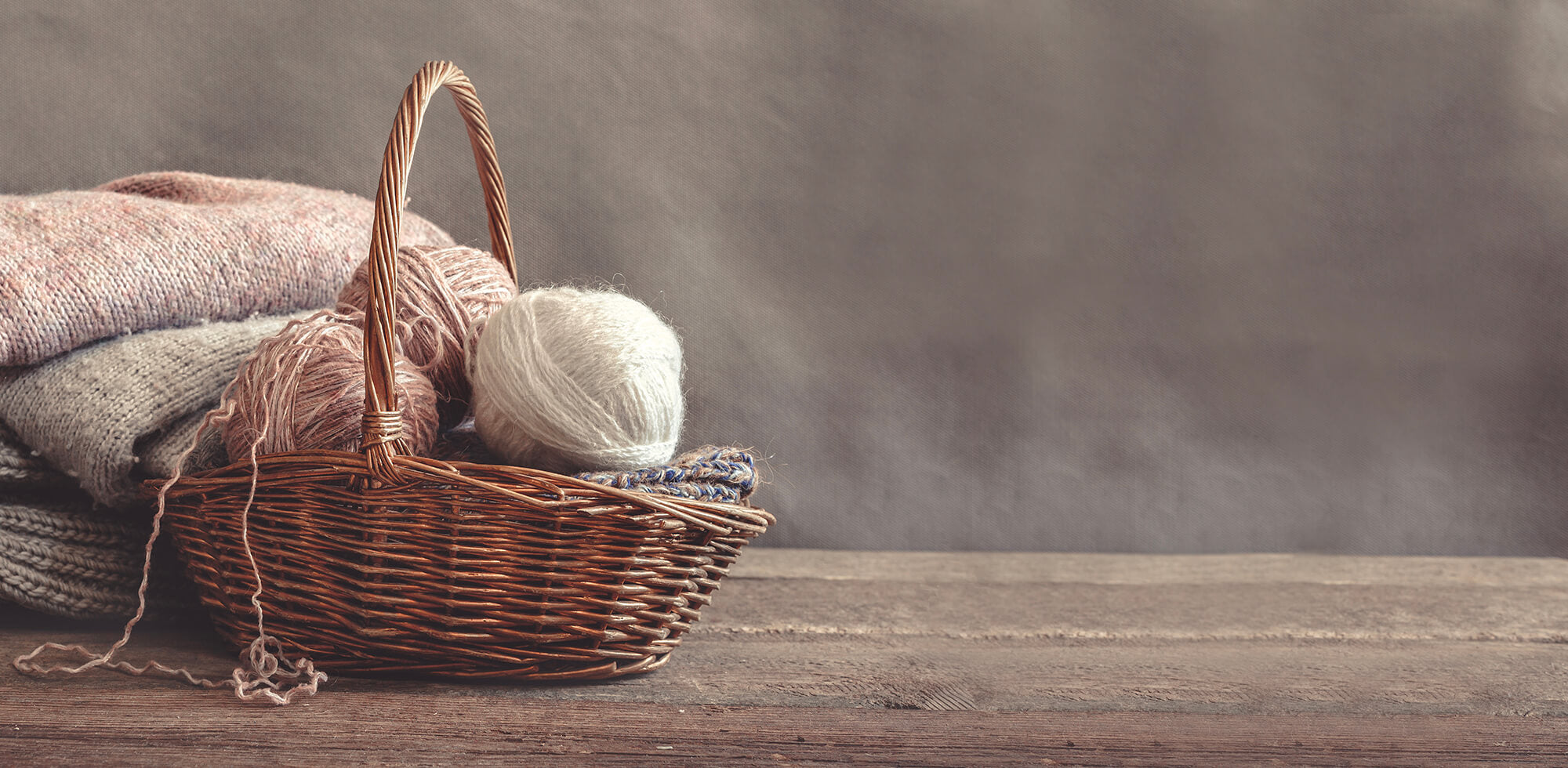By Claudia Ostrop
Handcrafts and DIYs are “in”. Perhaps this return to old techniques is a counter movement to the ever faster digital everyday life to which many of us are subject. DIY hobbies are associated with appreciation and sustainability.
But, what about the materials used? Are they also "good" in terms of fairness and sustainability? We believe that if you take the time to create something with your own hands, you should also take the time to pay attention to the origin of the wool, for example, with which a sweater, hat, scarf or other beautiful piece is knitted.
In this blog post, we would like to give you some tips on how you can ensure that neither humans, animals nor the environment have been exposed to bad conditions when choosing your yarns.
Certifications in the Textile Industry
Labels and logos that are supposed to provide information about the quality and origin of a product can be found almost everywhere. While the term "organic" is strictly regulated for food, it is not, for example, for textiles. Terms such as "Bio (Organic)" or " Eco" and "Natural" are not protected here, so misuse or misinformation are not excluded. In addition, it is generally not possible for consumers to understand whether the entire product or just a single part of the production chain is “Eco”. For example, a sheep can be kept according to the requirements of organic farming, but the wool can then have been produced under unfair, health-endangering working conditions and with the use of chemicals. Or the finished yarn is free of harmful residues, but the sheep had to endure the excruciating mulesing procedure (see below).
We'll introduce you to labels and certificates that you can use to guide yourself in the area of wool and yarns.
GOTS

The "Global Organic Textile Standard" (GOTS) is one of the best-known certificates in the textiles sector world-wide. The round green logo with the white shirt in the middle can be found on a variety of fabrics, textiles and yarns.
The GOTS certification is a processing standard which ensures strict criteria apply along the entire production chain from the harvesting of the raw materials through environmentally and socially responsible manufacturing all the way to the labelling. All individual steps in the manufacturing process must be certified before the GOTS label can be used.
Products that carry the GOTS label must consist of at least 70 % natural fibres from controlled organic farming or controlled organic animal husbandry. For the "organic" labels (see below) the proportion must be at least 95%.
Chemicals may only be used in the course of the production process if they meet specified requirements with regard to toxicity and biodegradability. Chlorine bleach and azo dyes, for example, are prohibited. The processing companies must have an environmental protection program in place to keep waste and wastewater as low as possible.
In addition to the environmental criteria, social standards must also be adhered to. Safe and hygienic working conditions are just as mandatory as the payment of minimum wages, the regulation of working hours and the prohibition of child labour and inhumane treatment.
The GOTS label, therefore, gives the consumer a relatively high level of security when it comes to the environmental and social compatibility of the products.
However, there is one big “but”, especially when it comes to mulesing * sheep:
The GOTS standard is based on the organic standards of the countries of origin. Since mulesing is allowed in Australian agriculture according to the organic standards that are in place there, it cannot be ruled out that wool obtained from the merino sheep coming from Australia may have undergone this painful procedure, despite the GOTS certificate. The only thing you can do if you want to be sure that the yarn (or the textiles) has been produced mulesing-free is to pay attention to the origin of the raw wool.
* Mulesing is the procedure in which the skin around the anus is extensively removed from merino sheep in order to prevent infestation with fly maggots that could lodge in the skin folds. Mulesing, mostly performed without anaesthesia, is common practice in Australia. About three-quarters of the merino wool produced worldwide comes from Australia.
RWS – Responsible Wool Standard

The Responsible Wool Standard (RWS) is a relatively new certificate that has been around since 2016. The focus of the RWS certification is on animal welfare and sustainable land management. The label certifies that the animals are treated well. There are specific guidelines for keeping the animals, ranging from food and cleanliness to stalls and fences to the prohibition of mulesing. In addition, the appropriate treatment of workers is also regulated. The entire production chain is subject to rigorous requirements and full transparency which covers all stages from the farm to the product once it is ready for sale.
The Responsible Mohair Standard or RMS which is based on RWS, has been in place since 2020 and regulates the welfare and keeping of angora and mohair goats and monitors the production chain for the production of mohair.
Both RWS and RMS are mainly animal welfare certifications, and although ecological factors are taken into account, no organic standard is achieved.
" Organic Farming" and " Organic Animal Husbandry”

There are two other certifications used for textiles and yarns: The " Certified Organic Farming" (Kontrolliert biologischer Anbau, kbA) and the "Controll Certified ed Organic Animal Husbandry"(Kontrolliert biologische Tierhaltung, kbT)
The "Certified Organic Farming" (kbA) certification is mostly related to cotton: cotton from organic farming. While unbelievable amounts of water and chemicals are used for the conventional cultivation of cotton (more on this in our blog post about viscose), the use of synthetic pesticides in organic cultivation, as well as the use of artificial fertilizers, is prohibited. Due to mixed cropping and crop rotation in cultivation, the soil is less depleted and can store significantly more water through organic matter. No genetically modified seeds may be used and the harvested cotton is processed further without environmentally harmful substances (e.g. formaldehyde or chlorine compounds). Organic farming means both environmental and health protection for the workers during the cultivation and production process and for the end users once the product is ready to be worn.
“Certified Organic Animal Husbandry (kbT)” certification follows the guidelines for organic farming focusing on species appropriate keeping of animals in harmony with nature. Neither genetically modified plants nor special fattening aids may be fed. The animals reproduce naturally and procedures such as mulesing and tail docking are prohibited. The organic standard regulates the species-appropriate feeding of animals with organically grown food, the animal welfare-friendly design of the stalls and access to sufficient pasture areas.
For the production of organic virgin wool, the use of pesticides and insecticides is completely dispensed with, this applies to the animals as well as to the pasture areas and, of course, the further processing of the wool.
Oeko-Tex

The Oeko-Tex label has been around since the early 1990s. It can be found on a variety of textiles such as clothing and bed linen, but also on yarn. The "Standard 100 by Oeko Tex" assures the consumer that products with this label have been tested for freedom from harmful substances. For example, no azo dyes, formaldehyde or cadmium must be used. Likewise, no pesticide residues may be found in the textiles. In addition to Standard 100, there are now expanded, stricter Oeko-Tex standards such as “Made in Green by Oeko Tex”. This also includes testing for a sustainable and socially acceptable production process.
The new, broader labels may be seen as a reaction to the criticism that the term “Oeko” is misleading. It gives the consumer the impression that the textiles were produced entirely in an ecological way, when in fact, only the labelled end product is ecologically acceptable and not harmful to health.
Woolmark

The Woolmark label has been around since the 1960s. It stands for quality in the wool sector. However, it only refers to the composition and type of wool used. The Woolmark label says nothing about sustainability, environmental friendliness and animal welfare.
Other Textile Certifications in Germany
The list goes on a long way.
Only a few are mentioned here that can be found mostly on finished textiles:
The "IVN" label (Internationalen Verband der Naturtextilwirtschaft e. V.) identifies textiles and leather that meet the strictest ecological and social standards throughout the entire production process.
The "Blue Angel" is an ecolabel awarded to products and services that are manufactured in a particularly environmentally friendly manner.
The “FairTrade” logo may be given to products that guarantee workers adequate, fair working conditions.
The “Green Button” is a government-run certification label for sustainable textiles and is conditional on compliance with a code of conduct with which demanding ecological and social standards are to be ensured.

Conclusion
If you are looking for a good yarn that is not just based on appearance, softness and price, you are well advised to take a look at textile labels. They all offer a good orientation opportunity to take environmental protection, animal welfare and social compatibility into account. Yarns and textiles that come with a label and a certification are probably a good choice.
But ... that doesn't mean that yarns without certification are automatically bad. Getting certified usually can be quite pricy. Smaller farms and businesses, in particular, often simply cannot afford this, even though they meet the criteria for a certificate. The financial investment just doesn't pay off.
In the Pascuali range, you will also find yarns without a label or certification. The reason for this, is that we evaluate the conditions through on site visits. We want to support small businesses and can do so when we are certain they meet our very high standards; when we know exactly how the animals are kept, what the working conditions are like and how the final yarn is spun and dyed.
So, you can sit back and knit or crochet with a clear conscience!




1 comment
Roswitha Laumen
Hallo, liebes Pascuali-Team,
vielen Dank für den ausführlichen und sehr interessanten Blogg zum Thema Nachhaltigkeit, Tierwohl, etc zum Thema Wollproduktion.
Ich kann nachvollziehen, dass kleine Wollbauern in der Mongolei kein Geld für Zertifizierungen GOT/kbt haben. Worauf darf ich mich im Hinblick auf das Tierwohl bei Pascuali Wolle verlassen können? Zu 100% kein Mulesing und Kupieren der Tierschwänze? Wie geht es der Kaschmirziege ( und allen anderen Tieren, die Wolllieferanten sind) nach der Schur? Sie haben nicht ohne Grund ein derart dichtes, warmes Fell. Wie können sie nach der Schur – also völlig nackt – in den kalten Anden überleben?
Herzlichen Dank vorab für Ihre Antworten und liebe Grüße aus dem Aachener Norden,
Roswitha
Hallo, liebes Pascuali-Team,
vielen Dank für den ausführlichen und sehr interessanten Blogg zum Thema Nachhaltigkeit, Tierwohl, etc zum Thema Wollproduktion.
Ich kann nachvollziehen, dass kleine Wollbauern in der Mongolei kein Geld für Zertifizierungen GOT/kbt haben. Worauf darf ich mich im Hinblick auf das Tierwohl bei Pascuali Wolle verlassen können? Zu 100% kein Mulesing und Kupieren der Tierschwänze? Wie geht es der Kaschmirziege ( und allen anderen Tieren, die Wolllieferanten sind) nach der Schur? Sie haben nicht ohne Grund ein derart dichtes, warmes Fell. Wie können sie nach der Schur – also völlig nackt – in den kalten Anden überleben?
Herzlichen Dank vorab für Ihre Antworten und liebe Grüße aus dem Aachener Norden,
Roswitha